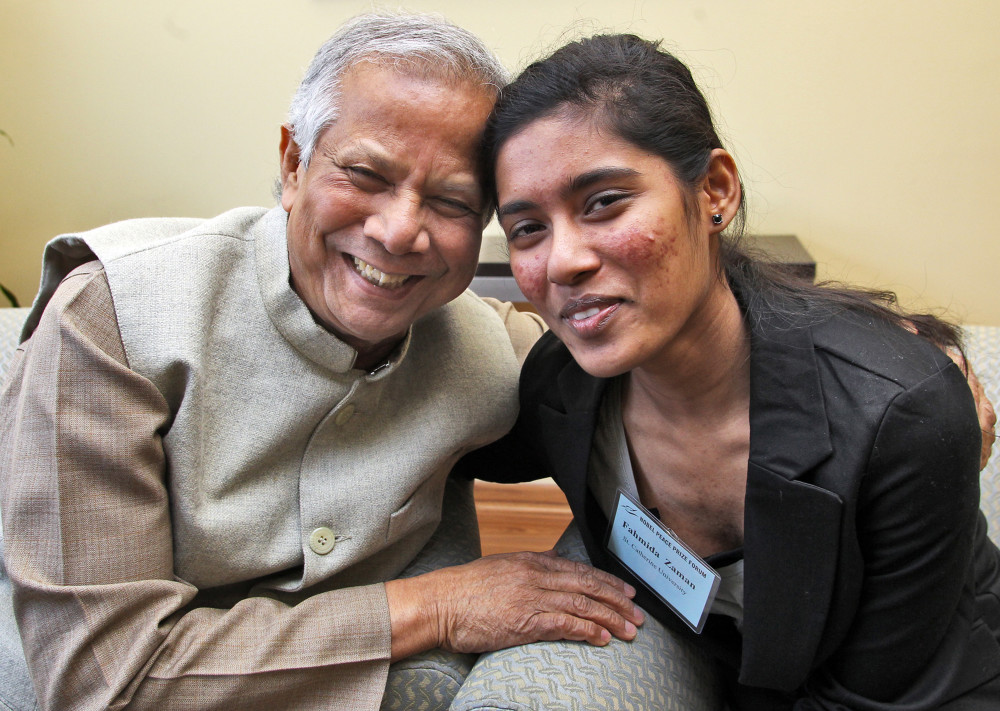By Sudeshna Sarkar
Khaleej Times, Dubai, United Arab Emirates
Nobel laureate Muhammad Yunus turned banking on its head, seeking glory, not profit
Since Muhammad Yunus was awarded the Nobel Peace Prize in 2006 along with the Grameen Bank he had founded, people know all about how the economics professor was moved by the plight of village women in the hands of loan sharks to lend $27 from his own pockets.
The sum, tiny as it was, helped 42 women and put him on the road to establishing a microfinance bank that gave minuscule loans to people ignored by traditional banks — without collateral and without seeking to make a profit.
But few know how he came to take his ‘social business’ to Haiti, the Caribbean island with poverty and corruption levels as high as his native Bangladesh.
“I was having dinner in a lovely five-star hotel with friends,” he tells a crowd of rapt listeners at the auditorium of the Emirates Centre for Strategic Studies and Research, who have invited him to deliver a lecture on “Social Business: A way to save society’s most pressing problem” as part of their 20th anniversary celebrations.
His friends told him, with a lot of pride, that everything on the table was imported. The fish came all the way from China, the poultry from neighbouring Dominican Republic, and even the salt was imported.
The 73-year-old, whose motto is to set up a business to solve every problem he encounters, was aghast.
“Haiti is an island surrounded by water and you import salt!” he said. “In Bangladesh, if we need salt we dry a bucket of water.”
His friends laughed uproariously. “It can’t be done here,” they said.
“It can be done,” he said. “I will start a restaurant which will say everything you eat here is grown in Haiti. We will make salt and teach people to grow poultry. The first challenge will be to grow eggs cheaper and better than Dominican Republic — and then import them to Dominican Republic.”
After the laughter in the auditorium subsides, the economist goes on to describe how it will work.
After the natural disasters — an earthquake in 2010 and a storm in 2012 — everyone became interested in Haiti and donors started pouring in money. But the bulk of it was going to waste since Haiti did not have the infrastructure to utilise it and there was rampant corruption.
So he began to approach the donors, asking for 10 per cent of the money to set up microfinance schemes. Though he is still a long way from building that hotel, last year his Yunus Social Business (YSB) signed up with Sir Richard Branson’s Virgin Unite and Bill Clinton’s Clinton Foundation to start an afforestation project to transform 10,000 acre of state-given barren land into lush green forest.
Microfinance — giving small loans to the people who need them most — can banish poverty, he says. “What is poverty? It is not created by the poor. It is created by the system. There is nothing wrong with the poor. The system doesn’t work for them.”
Yunus calls the poor “bonsai people”.
“The seed is good but we didn’t provide them enough soil. Society never gave them scope, so they remain stunted. We must fix the system.”
His solution is social business.
It’s not charity but starting a business that is self-sustaining. It doesn’t seek profit, just to have the capital back so that it can be ploughed back into other social businesses.
In 2008, Yunus decided to take on the system in New York City. People laughed at him, saying he was mad to attempt microfinance in the richest economy in the world but he was undeterred. Despite the superficial wealth, he knew “there are poor people everywhere”.
Grameen America started lending to people who had never borrowed before as the interest rates for people who could not pledge collateral were astronomical, from 500 to 1,000 per cent.
Now there are nearly 20,000 borrowers, all of them women, just like in Bangladesh. The average loan given is $1,500 and the repayment rate is a staggering 99.6 per cent.
“The whole banking is done on trust,” he explains. “Credit means trust.”
Grameen Bank lends out $1.5 billion a year, all of it going out without any collateral. “Can you sleep at night?’ my banker friends ask me,” he says smilingly. “I can but they can’t, thinking of all that money lent out without collateral.”
Yunus is heartened by two growing trends.
Multinationals are becoming interested in social business and seeking to be part of the process. In Colombia, McCain, the potato people — every third French fry in the world is made from McCain potatoes — joined YSB to start Campo Vivo, a venture to help farmers produce potatoes, carrots and peas and sell them.
The other phenomenon is youngsters getting drawn to social enterprise.
“In 2008, the (global financial) crisis came,” he says. “It didn’t disappear but took another form. Unemployment, especially among youngsters, is rampant in Europe. Now young people are becoming attracted to the idea.”
The “poor man’s banker” says unlike traditional banks, he is not in the social business to make money for himself: “The world is not about making money but about sustainability.
There are other incentives in life than profit — achievement, accomplishment, glory.”














































































































































































































































































































































































